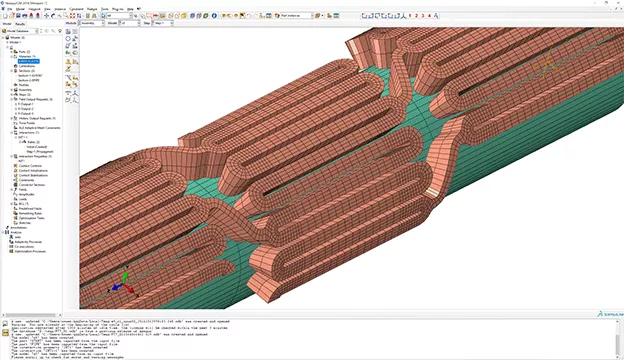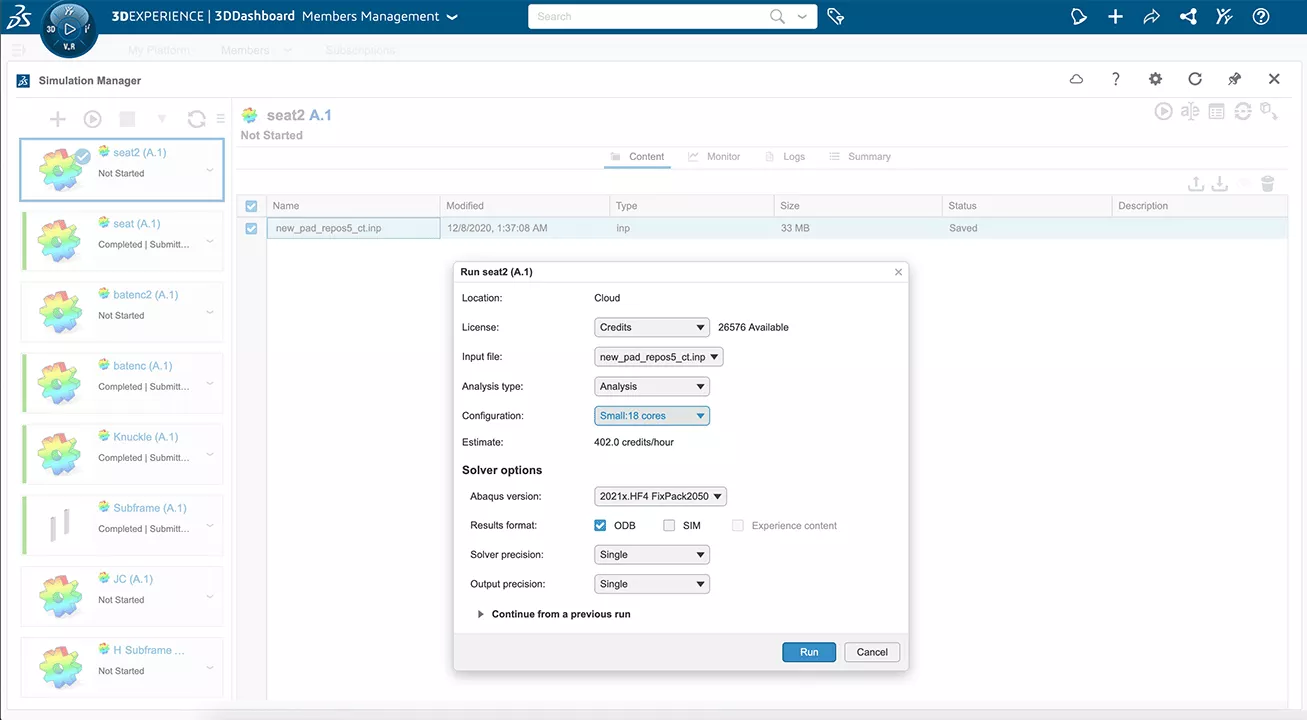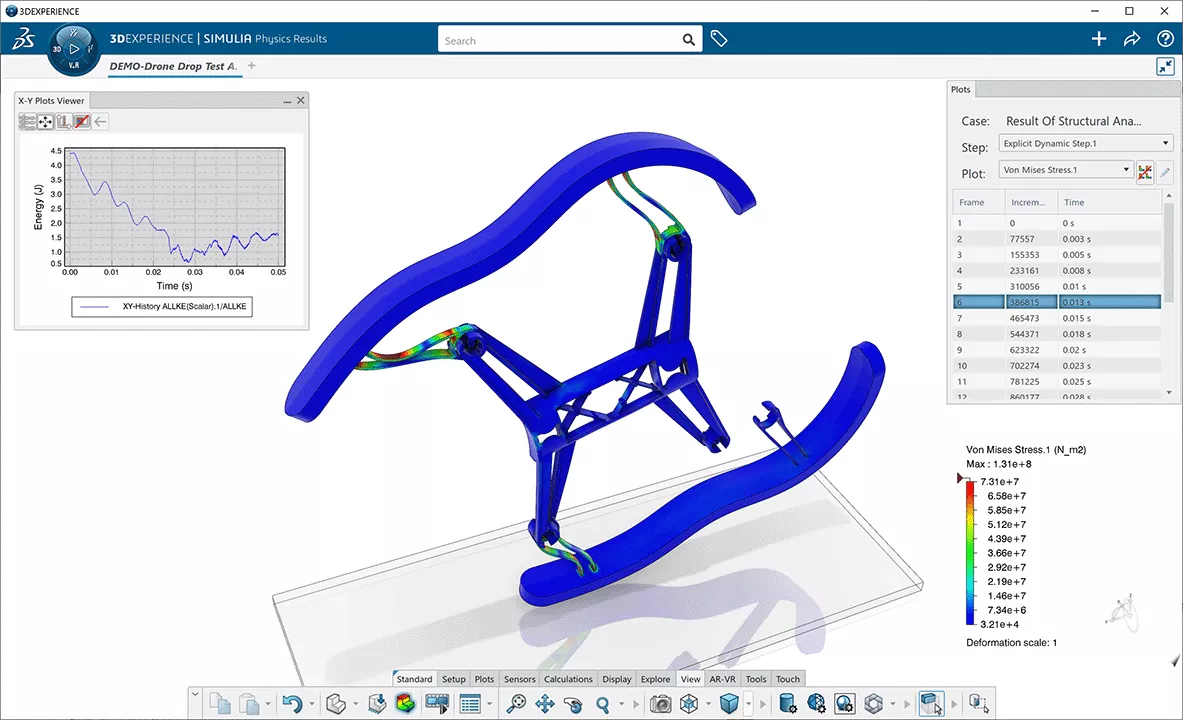Abaqus
Abaqus is the FEA (Finite Element Analysis) solver of choice for challenging nonlinear structural analyses. Companies of all sizes in every industry leverage the powerful features of Abaqus to produce better products, faster.
SUPERIOR SOLVERS
- Robust nonlinear implicit & explicit solvers
- Made for complex modeling, materials, interactions, and load histories
- Deeply user-customizable
EXTREME SCALABILITY
- Made for very large analyses over HPC/MPI
- Official cloud HPC compute services
EASE OF USE
- Traditional, modern, and third-party preprocessor options
- Native CAD associativity
ENABLEMENT SERVICES
- Quick-response Abaqus support from GoEngineer
- Custom training & methodology development from GoEngineer
“We chose a 3D EXPERIENCE Works Simulation solution because it’s cloud-based, which supports our remotely located engineering organization, works seamlessly with SOLIDWORKS design data, and incorporates the Abaqus Explicit solver, which is best suited for the types of simulation studies that we need to conduct on our parts, which can involve hyperelasticity, creep, fatigue, and contact.”
– Thomas Morgan
Design Engineer
Highlights
- ABAQUS/CAE
- ABAQUS/STANDARD
- ABAQUS/EXPLICIT
- ABAQUS CLOUD COMPUTE
- 3DEXPERIENCE STRUCTURAL
- ABAQUS LICENSING
- ABAQUS EXTENDED PORTFOLIO

ABAQUS/CAE
Abaqus/CAE is an easy-to-use, all-inclusive Abaqus work environment for Windows and Linux. It provides pre-/post-processing capabilities and job launching/monitoring in one interface.
- Import/export many popular CAD formats or create your own parametric models in-app.
- Add a two-way connector to your SOLIDWORKS, CATIA, or PTC CAD data.
- Supports shell, tetra, and hex elements, with adaptive remeshing.
ABAQUS/Standard
Abaqus/Standard is a high-accuracy implicit FEA solver for static and low-speed dynamic events. It covers a very wide range of analysis types both independently and in combination.
- General, linear, nonlinear, and linear perturbation analyses, including (but not limited to):
- Static stress/displacement
- Dynamic stress/displacement
- Low-cycle fatigue
- Thermal-stress
- Acoustics
- Anisotropy
- Hypoelasticity & hyperelasticity
- Viscoelasticity
- Porousness
- Hysteresis
- Plasticity
- Progressive damage & failure
- Damping
- Thermal expansion & conductivity
- Acoustics
- Composites
- Mass diffusion
- Electromagnetism
ABAQUS/Explicit
Abaqus/Explicit is a robust explicit FEA solver for severely nonlinear transient events. Users benefit from sophisticated nonlinear material modeling and automatic-but-customizable contact definition for the entire model.
- Repair, nondestructively defeature, and midsurface your geometry for analysis.
- Build surface and volume mesh with the automated parametric mesher.
- Supports shell, tetra, and hex elements, with adaptive remeshing.
- Anisotropy
- Hyperelasticity
- Viscoelasticity
- Plasticity
- Progressive damage & failure
- Thermal expansion & conductivity
- Composites

ABAQUS CLOUD COMPUTE
The official cloud compute service for Abaqus, powered by 3DEXPERIENCE, allows desktop Abaqus users to solve large models fast, without having to buy, maintain, and license software for expensive servers.
- Build your Abaqus model on your local machine and upload it to the 3DEXPERIENCE Platform.
- Use the 3DEXPERIENCE Simulation Manager to configure how you want your model to solve:
- Several years of Abaqus versions
- 4-192 CPU cores
- Single/double precision
- Restarts

3DEXPERIENCE STRUCTURAL
3DEXPERIENCE STRUCTURAL brings Abaqus to the 3DEXPERIENCE Platform. It includes the same powerful Abaqus solvers, but in a new cloud platform setting.
- One subscription includes pre-/post-processor and solver access (including cloud compute).
- Import loose CAD or natively interact with CAD in the 3DEXPERIENCE CLOUD PDM system.
- Simulation setup wizard can guide you through the whole model building process for common analyses.
- Preprocessor capabilities include automated mesh generation, connector building, scenario definition, and more.
- Solver is the latest version of Abaqus and includes all its benefits, such as multisolver & multiphysics analyses, robust contact algorithm, accurate material models, and great handling of nonlinearity.
- Solve on your local system or the cloud with included dual-use compute tokens. Add additional compute capability as you like, up to 192 cores.

ABAQUS LICENSING
License Types
- Perpetual: Grants permanent access to the latest version of Abaqus at time of purchase (and all versions prior). You may choose to pay the small annual support fee to receive ongoing, high-quality customer support from GoEngineer and access to the yearly major Abaqus update.
- Term: Available yearly and quarterly, you can also «pay as you go» for Abaqus. This periodic charge includes customer support and always gives you the latest Abaqus release (and all releases prior).
Licensed Items
- Abaqus/CAE: The Abaqus/CAE pre-/post-processor is a separate licensed item from the Abaqus solvers. While it is the official and recommended GUI for Abaqus, you may forgo it for a third-party solution.
- Abaqus/CAE Associative Interfaces (CAD Connectors): These Abaqus/CAE add-ons provide a two-way connection to CAD data for SOLIDWORKS, CATIA, and Creo (Pro/E).
- Abaqus/Viewer: For users who just need to view or post-process results, you can get Abaqus/Viewer instead of the full Abaqus/CAE at significant cost savings.
- Abaqus Solver Tokens: Abaqus licensing does not differentiate between its Standard and Explicit solvers. How many tokens you will need is simply a matter of how many CPU cores and GPUs you wish to solve on. Use the calculator below to determine your total tokens.
- Abaqus Cloud Credits: If you do not have a powerful local machine to solve large Abaqus models on, you can get «pay as you go» access to Dassault Systèmes’s official Abaqus cloud servers. Rather than tokens, Abaqus Cloud Compute uses credits that deplete over solve time. This is ideal for those whose need for Abaqus is not consistent throughout the year.
- One convenient arrangement is to buy a small amount of local solve tokens to run small jobs and debug large models, while also buying cloud compute credits to run those special large jobs.
Abaqus Token Calculator
How many CPU cores do you want your Abaqus solver to use? Use the slider below to find out how many tokens your core count will require. If you are using GPU acceleration, each GPU device counts as one additional core.
If you need calculations beyond 128 cores please enter your number of cores above. The calculator will update accordingly.
Tokens Required
Results: For a 1 -core Abaqus solve, I need 5 Abaqus tokens.
Abaqus Unified FEA
Due to its extensive range of functions, Abaqus is the gold standard in the art of simulation for a large variety of applications. It delivers an unrivalled, comprehensive, end-to-end solution for routine and sophisticated problems in many industries.
The diverse Finite Element (FE) solvers facilitate software-based analyses of complex loads in structural mechanics, dynamic vibrations, multi-body systems, and thermal problems with linear and non-linear characteristics.
While Abaqus is used predominantly in digital product development, it also can assist thereafter in the validation of designs. The aims of digital development are to reduce the number of hardware tests, optimise products, reduce the amount of materials required, and/or prolong the lifecycles of products. Ultimately, the goals are to cut down on development and production costs and/or to increase the product’s market share due to its enhanced performance.
Abaqus/CAE
CAE’s interface enables you to develop, edit, and monitor models or analyses efficiently and to visualise the results. To this end, you can import and then connect CAD geometries in common formats. Interfaces with CATIA V5, SolidWorks, and Pro/ENGINEER facilitate the synchronisation of CAD and CAE data, thus automating and speeding up the updating process. In addition, you can develop fully parametrised models to facilitate rapid design studies.
The CAE tools can be used to automate modelling processes as well as for analyses and/or evaluations. This helps process routine analyses with a high level of accuracy and efficiency and thus reduces cycles and cuts down on project costs.
Abaqus/Standard
Solution technology for linear and nonlinear finite element analysis
Array
Abaqus/Standard is a general-purpose finite-element solver whose technology is ideally suited for simulating true static and structural dynamic events. Abaqus/Standard applications include thermal-stress analysis, sealing evaluations, steady-state rolling simulation, fracture mechanics studies, heat transfer modeling, acoustics, pore pressure, etc. Abaqus/Standard has powerful linear dynamics capabilities including the AMS eigensolver which can efficiently find a large number of natural frequencies for models with a large number of degrees of freedom. Abaqus/Standard has a large library of element types for use in the wide range of its applications. It also has an extensive library of material models ranging from linear elasticity to rate-dependent kinematic plasticity to continuum damage. Users can customize and extend Abaqus/Standard through the coding of subroutines for material models, elements, loads, and boundary conditions. Abaqus/Standard is supported within the Abaqus/CAE modeling environment for all common pre- and post-processing needs.
Abaqus/Standard may be coupled with Abaqus/Explicit. A simulation that starts in Abaqus/Explicit can be continued in Abaqus/Standard and vice versa. This import functionality fallows Abaqus/Standard to be applied to those portions of the analysis that are well-suited to an implicit solution technique while Abaqus/Explicit may be applied to those portions of the analysis where high-speed, nonlinear, transient response dominates the solution.
Abaqus/Standard analysis types include:
- Nonlinear static and dynamic stress analysis
- Linear dynamics which includes a highly efficient AMS eigensolver
- Heat transfer
- Acoustics
- Multi-physics procedures for
- Thermal/structural simulations
- Thermal/structural/electrical simulations
- Battery simulations
Abaqus/Standard element types include:
- Linear and quadratic solid elements for stress analysis
- Structural elements: shell elements, beam elements, truss elements, membrane elements
- Elements for coupled simulations
- Thermal/structural elements
- Thermal/structural/electrical elements
- Piezoelectric elements
- Pore pressure elements
- Thermal/electrochemical elements for battery cell simulation
- Gaskets
- A wide range of kinematic behaviors
- Spot welds
- Adhesive connections
Abaqus/Standard material models include:
- Linear elasticity and viscoelasticity
- Nonlinear viscoelasticity
- Isotropic and kinematic plasticity
- Damage and fracture mechanics
- Multiscale and Mean-Field Homogenization
При подготовке материала использовались источники:
https://www.goengineer.com/abaqus
https://www.simuserv.de/en/software/abaqus
https://www.3ds.com/products-services/simulia/products/abaqus/abaqusstandard/